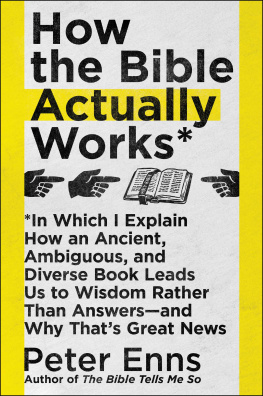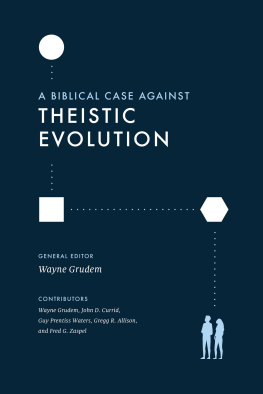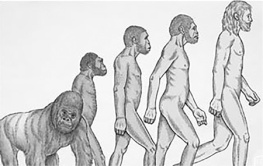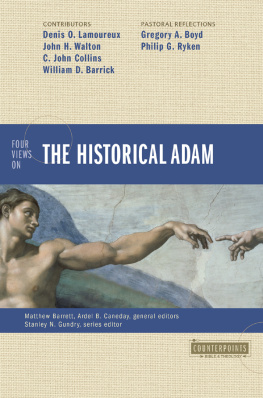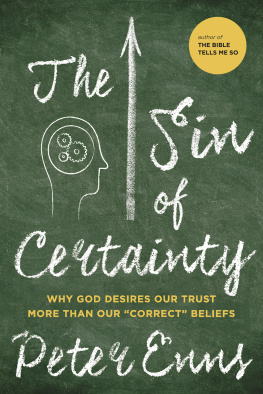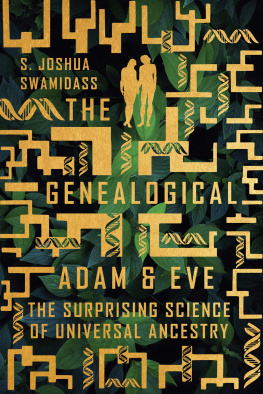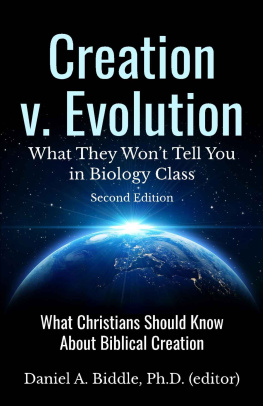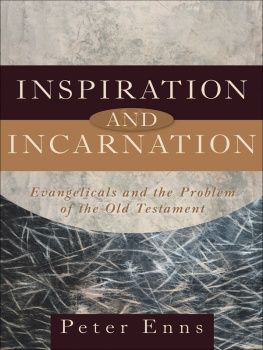
2012 by Peter Enns
Published by Brazos Press
a division of Baker Publishing Group
P.O. Box 6287, Grand Rapids, MI 495166287
www.brazospress.com
Ebook edition created 2011
Ebook corrections 3.21.2012
All rights reserved. No part of this publication may be reproduced, stored in a retrieval system, or transmitted in any form or by any meansfor example, electronic, photocopy, recordingwithout the prior written permission of the publisher. The only exception is brief quotation in printed reviews.
ISBN 978-1-4412-3633-3
Library of Congress Cataloging-in-Publication Data is on file at the Library of Congress, Washington, DC.
Unless otherwise indicated, Scripture quotations are from the New Revised Standard Version of the Bible, copyright 1989, by the Division of Christian Education of the National Council of the Churches of Christ in the United States of America. Used by permission. All rights reserved.
Scripture quotations labeled NIV are from the Holy Bible, New International Version. NIV. Copyright 1973, 1978, 1984, 2011 by Biblica, Inc. Used by permission of Zondervan. All rights reserved worldwide. www.zondervan.com
For my teachers who influenced me most
BKW
TLIII
RBG
JDL
and JLK
And to many others, for your encouragement
John 8:32
Contents
Acknowledgments
I am thankful for the many who have given freely of their time to read through the manuscript at its early stages and make numerous and insightful comments: Steve Bohannon, Justin Dombrowski, Brad Gregory, Rob Kashow, Daniel Kirk, Nathan Mastnjak, David Vinson, and Brandon Withrow. Others read the manuscript but asked that their names not be included here, and I understand and support that decision. I have benefited greatly from all of their comments; yet, as is always the case, the final product remains entirely my own and does not necessarily reflect their own views. I would like to thank Rob Kashow and Steve Bohannon in particular for tracking down various sources for me. Rob Kashow also proofread the final version and compiled the Scripture index. Steve Bohannon compiled the always-tricky subject index. I am deeply grateful to both for their extra work.
Many others were involved in this project, albeit indirectly. I have had many conversations over the years with scientists of uncompromising Christian faith who have either struggled mightily with how their faith and scientific work can coexist or have given up the synthetic work and grown content to trade their time between parallel universes of faith and science. I also have before my minds eye those Christians who are looking for constructive ways forward in the ever-present challenge of being thinking Christians in a modern world. Promptings from these communities have led me to write this book.
Further, I continue to be thankful to God for the intellectual and spiritual influences that have crossed my humble path. My seminary and doctoral work helped clarify for me the types of questions the Bible is prepared to answer. My spiritual guidespastors, friends, coworkershave helped me remember why we ask those questions at all. I trust that this book will honor them all, some of blessed memory.
Finally, my wife, Sue, and now-grown children, Erich, Elizabeth, and Sophie, have shown great strength over some difficult years, and I am proud of them. Each is also gifted with a highly calibrated nonsense meter, which seems to be turned on any time I become enamored of the sound of my own words. Theyve kept it real.
Introduction
Why This Book?
Evolutionary theory has been around for generations, but in recent years two factors are bringing the issue back into the public eye. The first is the relentless, articulate, and popular attacks on Christianity by the New Atheists. Jerry Coyne, Richard Dawkins, Daniel Dennett, and others have aggressively promoted evolution and argued that evolution has destroyed the possibility of religious faith, especially a faith like Christianity, whose sacred writings contain the story of Adam, the first man created out of dust several thousand years ago. The second factor has been well-publicized advances in our understanding of evolution, particularly genetics. The Human Genome Project, completed in 2003, has shown beyond any reasonable scientific doubt that humans and primates share common ancestry.
Evolution has crept back into the popular consciousness and has become a pressing issue for many Christians because evolution is typically understood to challenge, if not simply undermine, the story of origins presented in the Bible. Here my goal is not to arrive at final solutions, and it is certainly not to cover the many vital, complex, interwoven issues that evolution has brought to the theological table.
My goal is to focus solely on how the Bible fits into all of this. The biblical authors tell a very different story of human origins than does science. For many Christians, the question that quickly surfaces is how to accept evolution and also value Scripture as Gods Word. In other words, If evolution is true, what do I do with my Bible? Even limiting the focus this way is far more than any one book can adequately handle. My intention here is somewhat modest. I hope to clear away some misunderstandings and suggest different ways of thinking through some perennial problems in order to put interested readers on a constructive path and thus hopefully encourage further substantive discussion.
Let me begin by explaining whom I see as my primary audience. I make two assumptions about my readers. The first is that they consider themselves Christian, of whatever tradition or stripe, and so respect Scripture and recognize that what it says must be accounted for somehow. A significant subset of this group is an evangelical readership, particularly in an American context. Evangelical readers generally tend to live more in the tensions between their deep, instinctual commitment to Scripture and the challenges to that commitment that arise in life in the modern world. Often those challenges come from the natural sciences. This type of burden does not seem to be as pressing in either mainline forms of Christianity or in fundamentalism, and in saying so I mean no slight to either. I am simply addressing here the audience that will likely connect more immediately to the types of arguments laid out in this book and the need for engagement that I presume about my readers. I also want to suggest that the matter of evolution, particularly as it touches notions of biblical authority and a historical Adam (the heart of the evolution challenge), seems to meat least in my experiencemore particularly an American evangelical problem than a British evangelical problem. I therefore expect that not all self-identified evangelicals will recognize their own frame of mind in this book (although I still hope something might be gained from reading it).
Second, these same people are convinced, for whatever reason, that evolution must be taken seriously. They may not all agree on how specifically life has evolved, but they accept that evolution is the proper word to describe the process. My aim, therefore, is not to convince people that the Bible is important, nor is it to make people see that evolution is true. My aim is to speak to those who feel that a synthesis between a biblically conversant Christian faith and evolution is a pressing concern. And my purpose here is certainly not to undermine the faith of those who see things differently.
I also wish to statehowever brieflymy own precommitments as I engage this topic. My Christian faith is summed up in the Apostles and Nicene Creeds, which are expressions of broad Christian orthodoxy. More specifically to the points that will occupy us below, I believe in the universal and humanly unalterable grip of both death and sin, and the work of the Savior, by the deep love and mercy of the Father, in delivering humanity from them. I also try to follow the teachings of Scripture as a whole and Jesus in particular in my life as a follower of Christas a husband, father, churchgoer, scholar, and human being.


